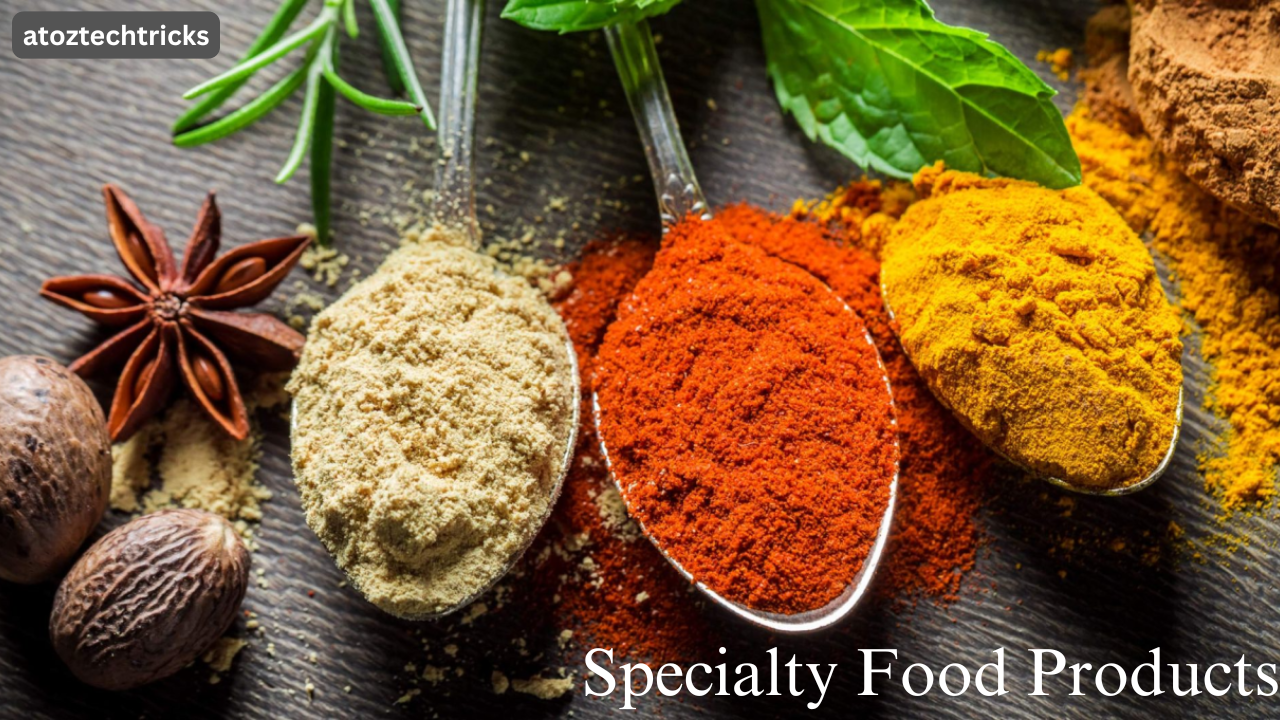Specialty Food Products: A Comprehensive Exploration

Specialty food products have emerged as a prominent sector in the global food industry, captivating the interest of consumers, retailers, and producers alike. Defined by their unique characteristics, high quality, and often limited production, specialty foods offer consumers something beyond the ordinary—whether it’s artisanal cheese, organic produce, gluten-free baked goods, or gourmet chocolates. This article delves into the world of specialty food products, exploring their defining attributes, the driving forces behind their growth, and their impact on consumers and the industry at large.
What Are Specialty Food Products?
Specialty food products are distinguished by their unique attributes, superior quality, and often an emphasis on premium ingredients or artisanal production methods. These products can include anything from exotic spices and organic teas to gourmet cheeses, handcrafted chocolates, and gluten-free baked goods. Unlike mass-produced items, specialty foods are typically created with care and attention to detail, often reflecting the cultural heritage, traditional techniques, or innovative approaches of the producers.
Key Characteristics of Specialty Foods
- High-Quality Ingredients: Specialty food products often use premium, natural, or organic ingredients, ensuring a higher standard of taste and nutrition.
- Artisanal Production: Many specialty foods are produced using traditional, small-batch methods, emphasizing craftsmanship and authenticity.
- Unique Flavors: These products often offer distinctive flavors and textures that are not found in conventional food items, catering to consumers looking for new and exciting culinary experiences.
- Health and Wellness: A significant portion of the specialty food market includes products that cater to specific dietary needs or health-conscious consumers, such as gluten-free, vegan, or non-GMO items.
- Cultural Significance: Specialty foods often have deep cultural roots, representing the culinary traditions of a particular region or community.
The Growth of the Specialty Food Market
The specialty food market has seen remarkable growth over the past decade, driven by several factors that reflect broader trends in consumer behavior, food production, and retail.
Consumer Demand for Quality and Authenticity
Today’s consumers are more informed and discerning than ever before, with a growing interest in the quality, origin, and production methods of the foods they consume. This shift has led to increased demand for specialty food products that offer transparency, authenticity, and a connection to the source.
- Transparency and Traceability: Many consumers seek transparency in the food supply chain, wanting to know where their food comes from, how it was produced, and whether it aligns with their values.
- Health Consciousness: The rise of health-conscious consumers has fueled demand for specialty foods that cater to specific dietary needs or preferences, such as organic, gluten-free, or plant-based options.
- Ethical and Sustainable Choices: Sustainability and ethical considerations are becoming increasingly important, with many consumers favoring products that are locally sourced, fair trade, or produced with minimal environmental impact.
Innovation and Diversity in Product Offerings
The specialty food industry is characterized by a high degree of innovation, with producers constantly developing new products and flavors to meet evolving consumer tastes.
- Global Flavors: As global travel and cultural exchange have increased, so has the demand for exotic and international flavors, leading to a more diverse range of specialty food products on the market.
- Fusion Cuisine: The blending of culinary traditions from different cultures has given rise to fusion cuisine, resulting in unique and innovative specialty food offerings.
- Functional Foods: There is a growing interest in functional foods that offer health benefits beyond basic nutrition, such as probiotic-rich yogurts, antioxidant-packed teas, and nutrient-dense snacks.
Meal Prep and Delivery Services: Revolutionizing the Way We Eat
The Role of E-commerce and Direct-to-Consumer Sales
The rise of e-commerce has been a significant driver of growth in the specialty food market. Online platforms have made it easier for consumers to access a wide range of specialty products that may not be available in their local grocery stores.
- Direct-to-Consumer (DTC) Sales: Many specialty food producers have embraced the DTC model, selling their products directly to consumers through online stores or subscription services. This approach allows for greater control over branding, pricing, and customer engagement.
- Subscription Boxes: The popularity of subscription boxes has introduced many consumers to new and exciting specialty foods, with curated selections delivered right to their doorsteps.
- Social Media and Influencer Marketing: Social media platforms have become powerful tools for promoting specialty food products, with influencers and food bloggers playing a key role in shaping consumer preferences and driving demand.
Categories of Specialty Food Products
Specialty foods encompass a wide range of categories, each with its own unique appeal and consumer base. Below are some of the most popular and rapidly growing categories in the specialty food market.
1. Artisanal and Gourmet Foods
Artisanal and gourmet foods represent the epitome of craftsmanship and quality in the specialty food market. These products are often made by hand, using traditional methods and premium ingredients.
- Cheese: Artisanal cheeses, made using traditional techniques and high-quality milk, are a staple of the gourmet food market. From creamy Brie to pungent Roquefort, these cheeses offer complex flavors and textures that appeal to connoisseurs.
- Charcuterie: Cured meats such as prosciutto, salami, and pâté are highly prized for their rich flavors and artisanal production methods. Specialty producers often emphasize the use of heritage breeds and traditional curing processes.
- Chocolates: Gourmet chocolates, often made with single-origin cacao and unique flavor infusions, are a popular indulgence among specialty food consumers.
2. Organic and Natural Foods
The demand for organic and natural foods continues to grow as consumers seek healthier and more environmentally friendly options.
- Organic Produce: Fruits and vegetables grown without synthetic pesticides or fertilizers are a cornerstone of the organic food market, offering consumers a more natural and sustainable choice.
- Natural Snacks: From dried fruit to nut butters, natural snacks made with minimal processing and no artificial additives have become a go-to option for health-conscious consumers.
- Free-From Products: Specialty foods that are free from common allergens or additives, such as gluten-free bread or dairy-free milk, cater to consumers with dietary restrictions or preferences.
3. Ethnic and International Foods
Ethnic and international foods bring the flavors of the world to consumers, offering a taste of different cultures and culinary traditions.
- Spices and Condiments: Exotic spices, sauces, and condiments, such as harissa, kimchi, and za’atar, have gained popularity as consumers seek to recreate global flavors at home.
- Specialty Grains and Legumes: Ingredients like quinoa, farro, and lentils, which are staples in many international cuisines, have found a place in the specialty food market due to their nutritional benefits and versatility.
- Prepared Meals and Sauces: Pre-packaged meals and sauces that reflect the authentic flavors of different regions, such as Indian curries or Italian pasta sauces, provide convenience without compromising on taste.
4. Functional and Health Foods
Functional and health foods are designed to offer specific health benefits, making them an essential part of the specialty food market.
- Superfoods: Foods rich in nutrients and antioxidants, such as acai berries, chia seeds, and kale, are often marketed as “superfoods” for their potential health benefits.
- Probiotic-Rich Products: Fermented foods like yogurt, kefir, and kombucha are prized for their probiotic content, which supports digestive health.
- Plant-Based Alternatives: As more consumers adopt vegetarian or vegan diets, the demand for plant-based meat, dairy, and egg alternatives has surged, leading to a proliferation of specialty products in this category.
5. Beverages
The specialty beverage market includes a wide range of products, from craft beers and fine wines to organic teas and cold-pressed juices.
- Craft Beverages: Small-batch, artisanal beverages, such as craft beers, ciders, and spirits, have gained a loyal following among consumers seeking unique and high-quality options.
- Specialty Coffee and Tea: Single-origin coffee beans, rare tea blends, and organic matcha are just a few examples of specialty beverages that cater to connoisseurs.
- Functional Drinks: Beverages that offer additional health benefits, such as detoxifying juices or energy-boosting shots, are a growing segment of the specialty beverage market.
The Impact of Specialty Food Products on the Industry
The rise of specialty food products has had a profound impact on the food industry, influencing everything from retail strategies to production practices.
Retail Adaptation and Expansion
As the demand for specialty foods has grown, retailers have adapted by expanding their product offerings and creating dedicated sections for these items.
- Gourmet Sections in Supermarkets: Many supermarkets have introduced gourmet or specialty food sections, offering consumers a curated selection of high-end products alongside their regular grocery items.
- Specialty Food Stores: Independent specialty food stores and boutiques have flourished, providing a niche market for products that may not be available in mainstream retail outlets.
- Farmers’ Markets and Pop-Ups: Farmers’ markets and pop-up shops have become popular venues for specialty food producers to reach consumers directly, offering fresh, local, and artisanal products.
Challenges and Opportunities for Producers
While the specialty food market offers significant opportunities for growth, it also presents challenges for producers, particularly in terms of scaling production and maintaining quality.
- Maintaining Quality at Scale: As specialty food producers grow, they must balance the need to scale up production with the need to maintain the high standards of quality that define their products.
- Navigating Regulatory Requirements: Specialty food producers must navigate a complex landscape of regulatory requirements, particularly if they are producing organic, non-GMO, or allergen-free products.
- Building Brand Loyalty: With so many options available, specialty food producers must work hard to build brand loyalty, often through storytelling, transparency, and direct engagement with consumers.
The Future of Specialty Food Products
The future of the specialty food market looks bright, with continued growth expected as consumers increasingly prioritize quality, authenticity, and sustainability in their food choices.
- Technological Innovation: Advances in food technology, such as precision fermentation and lab-grown meat, could lead to the development of new specialty products that push the boundaries of traditional food production.
- Sustainability and Ethical Sourcing: As consumers become more aware of the environmental and social impacts of their food choices, the demand for sustainably and ethically sourced specialty foods is likely to increase.
- Personalization and Customization: The trend towards personalized nutrition and customized food products could open up new opportunities in the specialty food market, allowing consumers to tailor their choices to their specific health needs and preferences.
Specialty food products represent a dynamic and rapidly growing sector of the global food industry, characterized by innovation, quality, and a deep connection to cultural and culinary traditions. As consumers continue to seek out unique, authentic, and health-conscious options, the specialty food market is poised for continued expansion and evolution. Whether through artisanal production, innovative flavors, or a commitment to sustainability, specialty foods offer a glimpse into the future of food—one where quality, creativity, and conscious consumption take center stage.






Post Comment